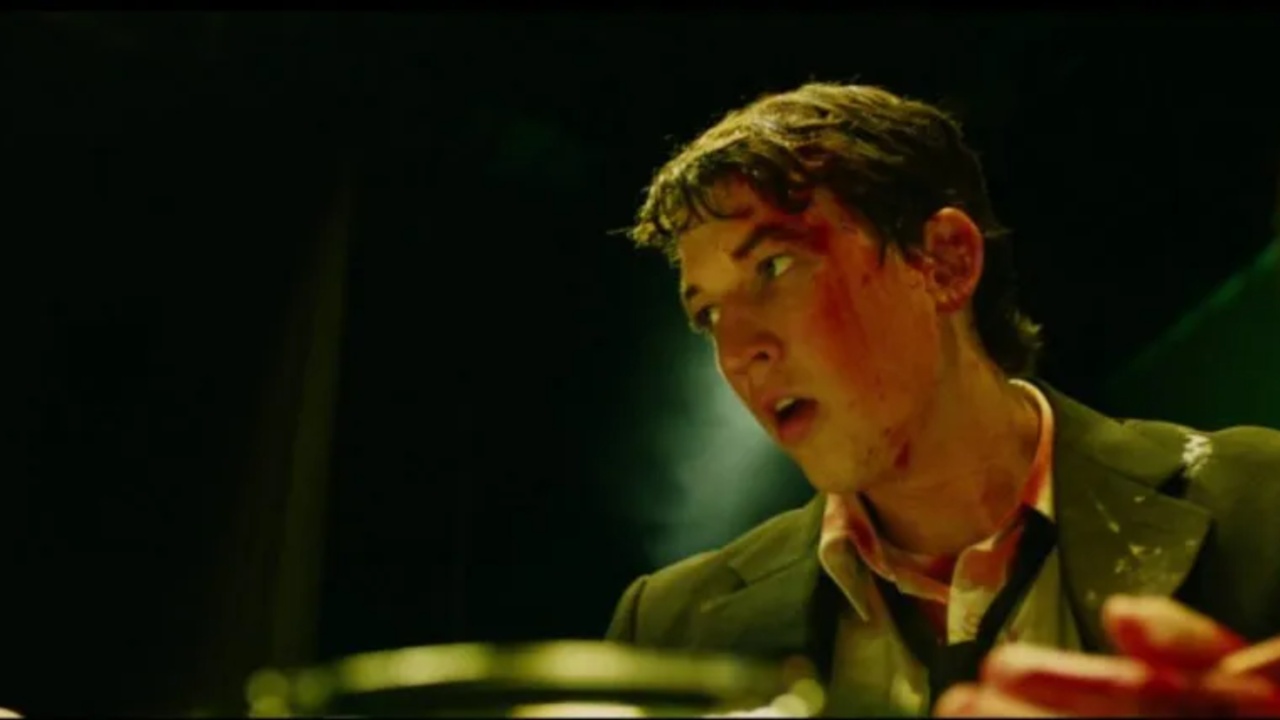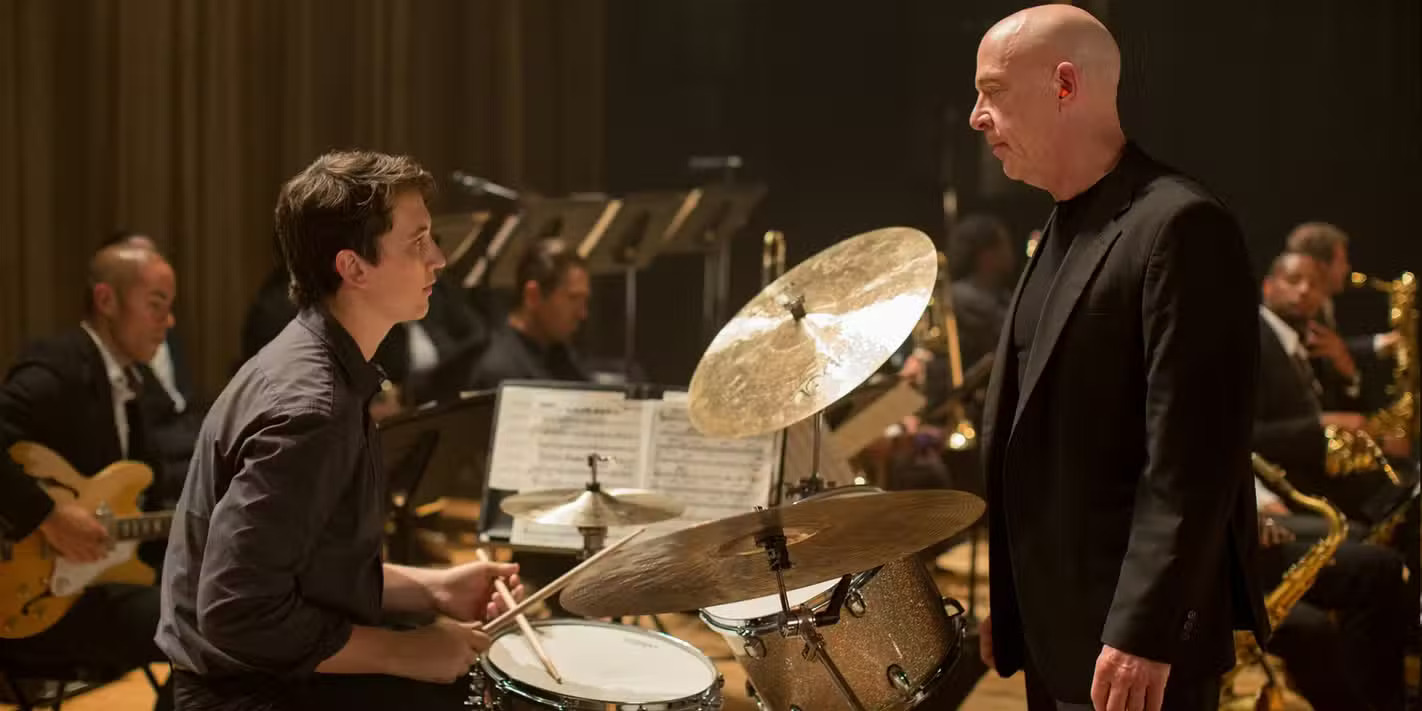Damien Chazelle’s Whiplash is widely remembered not only for its intense story but also for its unforgettable ending. The film follows young drummer Andrew Neiman, whose ambition drives him into a complex and often destructive relationship with his music teacher, Terrence Fletcher.
Fletcher pushes Andrew to extremes in the pursuit of perfection, using fear and manipulation as teaching tools. The climax of the film delivers a thrilling resolution that encapsulates the key themes of ambition, resilience, and the dangers of obsession, leaving audiences both exhilarated and unsettled. This combination of artistic tension and moral ambiguity has cemented Whiplash as one of the most discussed films in modern cinema.
At the heart of Whiplash is the fraught relationship between Andrew and Fletcher. Their dynamic is defined by a cycle of abuse, challenge, and triumph, creating a psychological battleground that drives the story. Fletcher’s extreme methods are designed to break his students and rebuild them as exceptional musicians.
Meanwhile, Andrew’s determination to succeed blinds him to the personal cost of this mentorship. Throughout the film, their interactions escalate in intensity, creating a sense of suspense that peaks in the final performance. This relationship is essential to understanding why the ending resonates so strongly with audiences, as it demonstrates the complex interplay between ambition and exploitation.
Andrew’s willingness to endure Fletcher’s abuse is rooted in his obsession with musical excellence. He sees every challenge, insult, and humiliation as a stepping stone toward greatness. Even after testifying against Fletcher and effectively ending his teacher’s career, Andrew cannot resist the opportunity to perform under him again.
This decision highlights the film’s exploration of how ambition can blind an individual to manipulation and harm. Andrew’s drive becomes both his greatest asset and his Achilles’ heel, as he prioritizes success over personal well-being, relationships, and even his own safety. It’s a stark portrayal of the high cost of obsessive ambition.

Fletcher’s Manipulation and Andrew’s Triumph Highlight Complex Morality in Mentorship Dynamics
The climactic concert scene reveals Fletcher’s enduring capacity for manipulation. Despite losing his position, Fletcher uses the performance as a chance to exact revenge on Andrew. By giving him the wrong sheet music and ensuring the presence of influential figures, Fletcher aims to publicly humiliate his student.
This moment underscores Fletcher’s dual role as both mentor and villain, showcasing his belief that suffering is essential to artistic growth. The concert becomes a battleground of control, where Andrew must decide whether to succumb to Fletcher’s trap or assert his own mastery. The tension in this scene makes the ending so riveting and unforgettable.
Despite Fletcher’s sabotage, Andrew takes control of the performance, transforming frustration into musical brilliance. After initially faltering and nearly walking offstage, he returns, leading the band through a powerful and technically masterful rendition. This moment signifies Andrew’s emergence as a true musician, capable of transcending Fletcher’s manipulative tactics.
It’s a turning point where he asserts both independence and talent, earning Fletcher’s grudging respect. The scene perfectly encapsulates the film’s core theme: that extreme pressure can sometimes push individuals to reach heights they otherwise might not achieve, even if the journey is morally and emotionally complex.
Whiplash challenges audiences to confront the moral ambiguity of mentorship. Fletcher’s abusive methods, while ethically indefensible, are presented as instrumental in unlocking Andrew’s potential. The film does not condone his behavior but illustrates that greatness is often forged through adversity.
The line between encouragement and exploitation is intentionally blurred, prompting viewers to question the cost of success. Andrew’s final performance demonstrates the paradox: the very person who tormented him enabled his breakthrough. This tension between achievement and abuse is what makes the ending both satisfying and morally troubling.

Damien Chazelle Reveals the Dark Costs Behind Andrew Neiman’s Fleeting Musical Triumph
Damien Chazelle has offered insights that deepen the film’s dark subtext. While the ending may appear triumphant, Chazelle suggests that Andrew’s success comes at a personal cost. In interviews, he speculates that Andrew might become a hollow figure, potentially succumbing to substance abuse and a shortened life, essentially inheriting Fletcher’s destructive tendencies. This interpretation frames the ending not as a celebration but as a cautionary tale about the sacrifices demanded by obsession and genius. Chazelle’s commentary emphasizes that the film’s victory is fleeting, and the cost of artistic ambition can be devastating.
Before the 2014 feature, Chazelle created a 2013 short film that introduced the intense dynamics between Andrew and Fletcher. The short focuses on a single rehearsal, where Fletcher berates Andrew, throws a chair, and physically intimidates him. The short lacks the climactic triumph of the feature film, presenting instead a stark portrayal of abuse without redemption. This early version highlights how the full-length Whiplash expanded on character development and narrative tension while retaining the core themes of mastery through adversity. It also illustrates Chazelle’s interest in exploring the extreme costs of artistic pursuit.
The ending of Whiplash remains one of the most debated in modern cinema. Some viewers interpret Andrew’s final performance as a vindication of Fletcher’s methods, while others see it as a tragic depiction of a young man trapped in a destructive cycle. Critics and audiences alike have praised the film’s tension, pacing, and emotional impact, with the final scene representing the culmination of all narrative and character arcs. Its moral ambiguity, combined with exhilarating musical performance, ensures that discussions about the film continue years after its release, cementing its legacy as both thrilling and thought-provoking.
Ultimately, the ending of Whiplash is a masterclass in tension, ambition, and moral complexity. It underscores the high stakes of artistic pursuit while questioning the ethical boundaries of mentorship. Andrew’s triumph, though exhilarating, comes with a sense of foreboding, illustrating that greatness often demands sacrifice. Fletcher’s role as both tormentor and enabler complicates traditional ideas of success and failure. By blending psychological drama with extraordinary musical performance, Chazelle created a film that captivates, disturbs, and inspires reflection, ensuring Whiplash remains a defining work in contemporary cinema.



